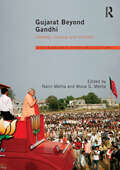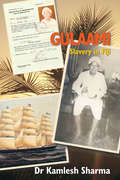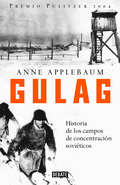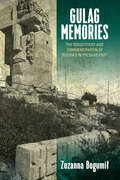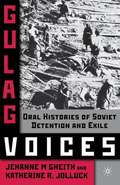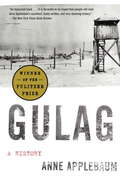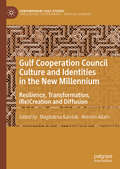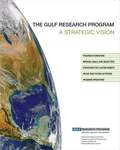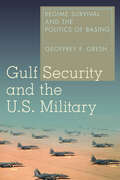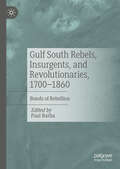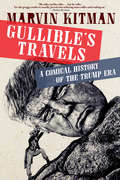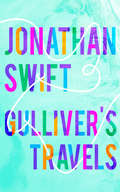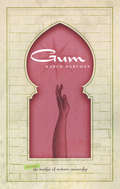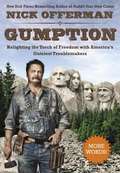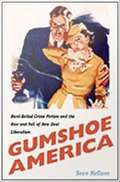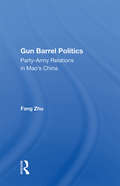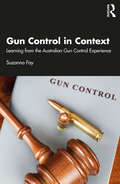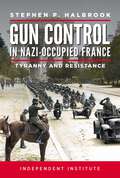- Table View
- List View
Guinea: Poverty Reduction Strategy Second Annual Progress Report
by International Monetary FundA report from the International Monetary Fund.
Guinea: Selected Issues and Statistical Appendix
by International Monetary FundA report from the International Monetary Fund.
Gujarat Beyond Gandhi: Identity, Society and Conflict (Routledge South Asian History and Culture Series)
by Nalin Mehta Mona G. MehtaThe birthplace of Mahatma Gandhi and the land that produced Mohammad Ali Jinnah, the founder of Pakistan, Gujarat has been at the centre-stage of South Asia’s political iconography for more than a century. As Gujarat, created as a separate state in 1960, celebrates its golden jubilee this collection of essays critically explores the many paradoxes and complexities of modernity and politics in the state. The contributors provide much-needed insights into the dominant impulses of identity formation, cultural change, political mobilisation, religious movements and modes of communication that define modern Gujarat. This book touches upon a fascinating range of topics – the identity debates at the heart of the idea of modern Gujarat; the trajectory of Gujarati politics from the 1950s to the present day; bootlegging, the practice of corruption and public power; vegetarianism and violence; urban planning and the enabling infrastructure of antagonism; global diasporas and provincial politics – providing new insights into understanding the enigma of Gujarat. Going well beyond the boundaries of Gujarat and engaging with larger questions about democracy and diversity in India, this book will appeal to those interested in South Asian Studies, politics, sociology, history as well as the general reader. This book was published as a special issue of South Asian History and Culture.
Gujarat Files: गुजरात फ़ाइल्स
by Rana Ayyubगुजरात फाइल्स राणा अय्यूब द्वारा लिखी गई एक साहसिक और विवादास्पद पत्रकारिता की किताब है, जो 2002 के गुजरात दंगों के दौरान और बाद में हुई घटनाओं की पर्दाफाश करती है। इस पुस्तक में राणा अय्यूब ने एक गुप्त रिपोर्टर के रूप में काम करते हुए, गुजरात सरकार के अधिकारियों और पुलिस अधिकारियों से मुलाकात की और उनके साक्षात्कार किए। इस दौरान उन्होंने राज्य में सांप्रदायिक हिंसा के दौरान और उसके बाद हुई राजनीतिक और प्रशासनिक गड़बड़ियों का खुलासा किया। पुस्तक में लेखक ने बताया है कि कैसे राज्य सरकार और उसके शीर्ष अधिकारियों ने दंगों के बाद न्याय की प्रक्रिया में हस्तक्षेप किया और सांप्रदायिक हिंसा को नियंत्रित करने के लिए आवश्यक कदम नहीं उठाए। राणा अय्यूब ने गुप्त रूप से अपने साक्षात्कारों को रिकॉर्ड किया और कई चौंकाने वाली जानकारी का खुलासा किया, जिसमें यह भी शामिल है कि कैसे कानून के प्रवर्तन और सरकार की मिलीभगत से दंगाइयों को बचाने की कोशिश की गई। यह पुस्तक न केवल गुजरात के दंगों का बल्कि भारतीय लोकतंत्र के विभिन्न पहलुओं का भी गहन विश्लेषण प्रस्तुत करती है। यह एक साहसिक प्रयास है, जिसमें लेखक ने व्यक्तिगत जोखिम उठाकर सत्य को सामने लाने की कोशिश की है। यह उन लोगों के लिए एक महत्वपूर्ण पुस्तक है जो भारतीय राजनीति, न्याय प्रणाली और मीडिया की स्वतंत्रता के बारे में गहरी समझ प्राप्त करना चाहते हैं। गुजरात फाइल्स सत्ता और भ्रष्टाचार के खतरों का एक उदाहरण है और इसने एक नए सिरे से बहस छेड़ी है कि किस हद तक राज्य व्यवस्था का दुरुपयोग किया जा सकता है।
Gulaami: Indentured Labour - Fiji
by Dr Kamlesh SharmaGulaami documents the experiences of a Girmitiya (Indentured Labourer) in Fiji who is originally from the village of Devadeha in the district of Basti in Uttar Pradesh. The reinvented slave trade of the mid 1850s by the British resulted in the removal of hundreds of thousands of Indians from their motherland, India and transplanted against their wishes in the British colonies (including Fiji) across the globe. In the South Pacific setting, slavery in Fiji is a story of the forgotten stolen generation right in the backyard of countries such as Australia and New Zealand. The story of Gulaami is about the ancestors of the Fijiindians who sacrificed so much for the betterment of Fiji and the emergence of the Fijiindian society, who are still struggling for equality and justice in the only country that they have known since their birth, Fiji.
Gulag
by Anne ApplebaumEl Gulag aparece en la conciencia de occidente en 1977 con la publicación de la obra de Aleksandr Solzhenitsin Archipiélago GULAG. A partir de nuevos estudios, memorias publicadas tras la caída de la URSS y algunos archivos hasta ahora secretos, Anne Applebaum realiza una reconstrucción histórica del origen y la evolución de los campos de concentración soviéticos que devuelve este infausto e inolvidable episodio al centro de la tormentosa historia del convulso siglo XX. Con detalle y precisión asistimos a la vida cotidiana en el campo: las automutilaciones para evitar los trabajos forzados, las bodas entre prisioneros, la vida de las mujeres y los niños, las rebeliones y los intentos de fuga. El libro, documentado y riguroso, sostiene que el Gulag nació no solo por la necesidad de aislar a los elementos que el Partido Comunista consideraba enemigos, sino para conseguir, al mismo tiempo, una masa de trabajadores-esclavos que trabajara a cambio de comida en inmensos proyectos como el canal del mar Blanco o las minas de Kolimá. Tras la descripción del horror organizado por el régimen soviético, el libro narra cómo Gorbachov, cuya familia se vio directamente afectada por esta política represiva, decidió terminar con este régimen carcelario liberando a la ciudadanía de uno de los más perversos y crueles sistemas represivos que el mundo ha conocido. «El Gulag de Anne Applebaum es un libro importante. Sus muchos años de minuciosa investigación han provisto a la autora de un inmenso caudal de fascinantes detalles para recrear una terrible e inolvidable historia.» ANTHONY BEEVOR, autor de Stalingrado
Gulag Memories: The Rediscovery and Commemoration of Russia's Repressive Past
by Zuzanna BogumiłThough the institution of the Gulag was nominally closed over half a decade ago, it lives on as an often hotly contested site of memory in the post-socialist era. This ethnographic study takes a holistic, comprehensive approach to understanding memories of the Gulag, and particularly the language of commemoration that surrounds it in present-day Russian society. It focuses on four regions of particular historical significance—the Solovetsky Islands, the Komi Republic, the Perm region, and Kolyma—to carefully explore how memories become a social phenomenon, how objects become heritage, and how the human need to create sites of memory has preserved the Gulag in specific ways today.
Gulag Voices
by Jehanne M Gheith Katherine R. JolluckIn this volume, the powerful voices of Gulag survivors become accessible to English-speaking audiences for the first time through oral histories, rather than written memoirs. It brings together interviews with men and women, members of the working class and intelligentsia, people who live in the major cities and those from the "provinces," and from an array of corrective hard labor camps and prisons across the former Soviet Union. Its aims are threefold: 1) to give a sense of the range of the Gulag experience and its consequences for Russian society; 2) to make the Gulag relevant to English-speaking readers by offering comparisons to historical catastrophes they are likely to know more about, such as the Holocaust; and 3) to discuss issues of oral history and memory in the cultural context of Soviet and post-Soviet society.
Gulag: A History
by Anne ApplebaumPULITZER PRIZE WINNER • This magisterial and acclaimed history offers the first fully documented portrait of the Gulag, from its origins in the Russian Revolution, through its expansion under Stalin, to its collapse in the era of glasnost.&“A tragic testimony to how evil ideologically inspired dictatorships can be.&” –The New York Times The Gulag—a vast array of Soviet concentration camps that held millions of political and criminal prisoners—was a system of repression and punishment that terrorized the entire society, embodying the worst tendencies of Soviet communism. Applebaum intimately re-creates what life was like in the camps and links them to the larger history of the Soviet Union. Immediately recognized as a landmark and long-overdue work of scholarship, Gulag is an essential book for anyone who wishes to understand the history of the twentieth century.
Gulag: Historia de los campos de concentración soviéticos (Annals Of Communism Ser.)
by Anne ApplebaumUna extensa y detallada historia del origen y el desarrollo de los Gulags soviéticos y su herencia hasta la actualidad. El Gulag aparece en la conciencia de occidente en 1977 con la publicación de la obra de Aleksandr Solzhenitsin Archipiélago Gulag. A partir de nuevos estudios, memorias publicadas tras la caída de la URSS y algunos archivos hasta ahora secretos, Anne Applebaum realiza una reconstrucción histórica del origen y la evolución de los campos de concentración soviéticos que devuelve este infausto e inolvidable episodio al centro de la tormentosa historia del convulso siglo XX. Con detalle y precisión asistimos a la vida cotidiana en el campo: las automutilaciones para evitar los trabajos forzados, las bodas entre prisioneros, la vida de las mujeres y los niños, las rebeliones y los intentos de fuga. El libro, documentado y riguroso, sostiene que el Gulag nació no solo por la necesidad de aislara los elementos que el Partido Comunista consideraba enemigos, sino para conseguir, al mismo tiempo, una masa de trabajadores-esclavos que trabajara a cambio de comida en inmensos proyectos como el canal del mar Blanco o las minas de Kolimá. Tras la descripción del horror organizado por el régimen soviético, el libro narra cómo Gorbachov, cuya familia se vio directamente afectada por esta política represiva, decidió terminar con este régimen carcelario liberando a la ciudadanía de uno de los más perversos y crueles sistemas represivos que el mundo ha conocido. Reseña:«El Gulag de Anne Applebaum es un libro importante. Sus muchos años de minuciosa investigación han provisto a la autora de un inmenso caudal de fascinantes detalles para recrear una terrible e inolvidable historia.»Anthony Beevor, autor de Stalingrado
Gulf Conference on Sustainable Built Environment
by Ali Bumajdad Walid Bouhamra Osamah A. Alsayegh Hasan A. Kamal Salem Falah AlhajrafThis volume brings together outstanding contributions to the Gulf Conference on Sustainable Built Environment, held at the Marina Hotel Kuwait, near Kuwait City. The Proceedings collects 29 papers on a range of engineering and materials challenges, and best practices, addressing development of new sustainable building materials, performance improvement of structures and tall buildings, developing monitoring and analysis techniques and frameworks for existing infrastructure under environmental effects, development of long-term sustainability plans for building stock, and development of energy efficient buildings in the gulf region. The Conference was organized by the Kuwait Foundation for the Advancement of Sciences (KFAS), the Massachusetts Institute of Technology, the Kuwait Institute for Scientific Research, and Kuwait University.
Gulf Cooperation Council Culture and Identities in the New Millennium: Resilience, Transformation, (Re)Creation and Diffusion (Contemporary Gulf Studies)
by Nermin Allam Magdalena KarolakThe book analyzes recent changes to the identities and cultures of the GCC countries. These important transformations have gone largely unnoticed due to the fast-paced changes in the region that affect all aspects of society. The volume unpacks these transformations by looking from a holistic perspective at the intersections of language, arts, education, political culture, city, regional alliances and transnational identities. It offers selected case studies based on original research carried out in the region. Chapter 7, ‘Identity Lost & Found: Architecture and Identity Formation in Kuwait and the Gulf’, of this book is available open access under a CC BY 4.0 license at link.springer.com
Gulf Research Program: A Strategic Vision
by Advisory GroupIn 2010 the Deepwater Horizon explosion and fire in the Gulf of Mexico caused the largest offshore oil spill in U. S. history, resulting in significant impacts on the region\'s environment and residents. Legal settlements with the companies held responsible led the federal government to ask the National Academy of Sciences to form and administer a 30-year program to enhance oil system safety, human health, and environmental resources in the Gulf of Mexico and other U. S. continental shelf areas where offshore oil and gas exploration and production occur or are under consideration. The new Gulf Research Program will receive $500 million to support activities using three broad approaches: research and development, education and training, and environmental monitoring. The Gulf Research Program: A Strategic Vision establishes the Program\'s foundation and introduces its mission, goals, and objectives. It describes some initial activities and sets out the Program\'s vision for contributing lasting benefit to the Gulf region and the nation. The Program is an extraordinary opportunity to foster science on a regional scale and over the long term. The document will be of interest to scientists, health professionals, engineers, and educators who wish to learn about, collaborate with, and submit proposals to the Program, and to all those who share the goal of enhancing resilience in areas where offshore energy production, vibrant communities, and dynamic ecosystems coexist.
Gulf Security and the U.S. Military: Regime Survival and the Politics of Basing
by Geoffrey F. GreshThe U. S. military maintains a significant presence across the Arabian Peninsula but it must now confront a new and emerging dynamic as most Gulf Cooperation Council countries have begun to diversify their political, economic, and security partnerships with countries other than the United States--with many turning to ascending powers such as China, Russia, and India. For Gulf Arab monarchies, the choice of security partner is made more complicated by increased domestic and regional instability stemming in part from Iraq, Syria, and a menacing Iran: factors that threaten to alter totally the Gulf's current security dynamic. Understanding the dynamics of base politicization in a Gulf host nation--or any other--is therefore vitally important for the U. S. today. Gulf National Security and the U. S. Military examines both Gulf Arab national security and U. S. military basing relations with Gulf Arab monarchy hosts from the Second World War to the present day. Three in-depth country cases--Saudi Arabia, Bahrain, and Oman--help explain the important questions posed by the author regarding when and why a host nation either terminated a U. S. military basing presence or granted U. S. military basing access. The analysis of the cases offers a fresh perspective on how the United States has adapted to sometimes rapidly shifting regional security dynamics and factors that influence a host nation's preference for eviction or renegotiation, based on its perception of internal versus external threats.
Gulf South Rebels, Insurgents, and Revolutionaries, 1700-1860: Bonds of Rebellion
by Paul BarbaGulf South Rebels, Insurgents, and Revolutionaries is a collection of essays on the tangled yet variegated histories of rebellious actors in the eighteenth- and nineteenth-century Gulf South and its linked environs. Following diverse rebels, revolutionaries, militants, insurgents, opportunists, and subversives from the early eighteenth-century alluvial floodplains of Louisiana to the mid-nineteenth-century coastal prairies of southeast Texas, this volume recasts the Gulf South as a centripetal region in the history of early America, a place where worlds collided, overlapped, combined, and renewed themselves, where revolutionary fervor could thrive and percolate, mix, and coagulate. Bound together by violence, exploitation, greed, honor, family, community, and ideological commitment, Gulf South rebels drew from longer traditions of insurgency, even as they forged new ones. Their legacies would resonate well beyond their seemingly localized disturbances, from the Caribbean to western Europe, illuminating how Indigenous, Black, and Euro-American Gulf South rebels operated in a rapidly shrinking, colonial world.
Gullible's Travels: A Comical History of the Trump Era
by Marvin KitmanHow to have fun hating TrumpKitman describes the land of Gulliblesylvania as a democratic country ruled by 34.9 % of the people, "a minority better known as 'the base,' of whom a candidate said he could shoot someone on Fifth Avenue and they would still vote for him." At first Kitman assumed that Trump's candidacy was a publicity stunt. After he realized it was serious, as a satirist he felt very lucky and began to keep a comical journal, modeled after A Journal of the Plague Year which Daniel Defoe described as "Observations of the most remarkable occurrence, which happened in London during the last great visitation in 1665"--which is not to compare the Trump administration to the bubonic plague, Kitman hastens to add. "For one thing, as our POTUS has been telling us, he's made America Great again--AND IT ONLY TOOK A YEAR AND A HALF!" Kitman adds, "And I have never before had such a good time observing and writing about the follies of our country."Gullibles Travels includes 32 "Trumponicles; the debate over the president's intellectual capacity; "That Russian Thing;" "Who is Agent Orange"; and a CODA that asks the question, "How Will It All End?" Impeachment? 25th Amendment sacking? Resignation? Or reelection?
Gulliver's Travels: Travels Into Several Remote Nations Of The World, In Four Parts, By Lemuel Gulliver, First A Surgeon, And Then A Captain Of Several Ships
by Jonathan SwiftAlso known as Travels into Several Remote Nations of the World. In Four Parts. By Lemuel Gulliver, First a Surgeon, and then a Captain of Several Ships, Gulliver’s Travels is a wickedly clever novel satirizing both human nature and the “travellers’ tales” literary subgenre, and was an immediate success upon publication in 1726. To this day, Gulliver’s Travels is Swift’s best-known work and one of the most popular books in the world. The novel describes the four voyages of Lemuel Gulliver, a ship’s surgeon. In Lilliput, he discovers a miniature world; in Brobdingnag, a land of giants; in Laputa, a flying island, he encounters a society of speculators and projectors who have lost grip on everyday reality; and in the land of the Houyhnhnms, gentle horses come in contrast to the bestial Yahoos that closely resemble humans. Swift’s savage satirical prose views humankind in a distorted hall of mirrors as a diminished, magnified, and bestial species, presenting readers with an uncompromising reflection of our existence. Penguin Random House Canada is proud to bring you classic works of literature in e-book form, with the highest quality production values. Find more today and rediscover books you never knew you loved.
Gum
by Karen HartmanIn Karen Hartman's "juicyfruit tragedy," two young sisters discover new appetites within the walls of their father's garden. Gum explores the need to tame nature in a fictional fundamental country where the title candy is contraband and every desire has its price. "A brief, intense, beguiling, sensual, witty, impassioned, deeply moving and brightly burnished gem"--San Francisco Examiner. Also includes The Mother of Modern Censorship.Karen Hartman is the author of Girl Under Grain, Troy Women and Alice: Tales of a Curious Girl. She is a native of San Diego who lives in Brooklyn and is currently the playwright-in-residence at Princeton University.
Gumption
by Nick OffermanThe star of Parks and Recreation and author of the New York Times bestseller Paddle Your Own Canoe returns with a second book that humorously highlights twenty-one figures from our nation's history, from her inception to present day--Nick's personal pantheon of "great Americans."To millions of people, Nick Offerman is America. Both Nick and his character, Ron Swanson, are known for their humor and patriotism in equal measure.After the great success of his autobiography, Paddle Your Own Canoe, Offerman now focuses on the lives of those who inspired him. From George Washington to Willie Nelson, he describes twenty-one heroic figures and why they inspire in him such great meaning. He'll combine both serious history with light-hearted humor--comparing, say, George Washington's wooden teeth to his own experience as a woodworker. The subject matter will also allow Offerman to expound upon his favorite topics, which readers love to hear--areas such as religion, politics, woodworking and handcrafting, agriculture, creativity, philosophy, fashion, and, of course, meat.From the Hardcover edition.
Gumption: Relighting the Torch of Freedom with America's Gutsiest Troublemakers
by Nick OffermanThe star of Parks and Recreation and author of the New York Times bestseller Paddle Your Own Canoe returns with a second book that humorously highlights twenty-one figures from our nation's history, from her inception to present day--Nick's personal pantheon of "great Americans."To millions of people, Nick Offerman is America. Both Nick and his character, Ron Swanson, are known for their humor and patriotism in equal measure.After the great success of his autobiography, Paddle Your Own Canoe, Offerman now focuses on the lives of those who inspired him. From George Washington to Willie Nelson, he describes twenty-one heroic figures and why they inspire in him such great meaning. He combines both serious history with light-hearted humor--comparing, say, Benjamin Franklin's abstinence from daytime drinking to his own sage refusal to join his construction crew in getting plastered on the way to work. The subject matter also allows Offerman to expound upon his favorite topics, which readers love to hear--areas such as religion, politics, woodworking and handcrafting, agriculture, creativity, philosophy, fashion, and, of course, meat.From the Hardcover edition.
Gumshoe America: Hard-Boiled Crime Fiction and the Rise and Fall of New Deal Liberalism
by Sean MccannIn Gumshoe America Sean McCann offers a bold new account of the hard-boiled crime story and its literary and political significance. Illuminating a previously unnoticed set of concerns at the heart of the fiction, he contends that mid-twentieth-century American crime writers used the genre to confront and wrestle with many of the paradoxes and disappointments of New Deal liberalism. For these authors, the same contradictions inherent in liberal democracy were present within the changing literary marketplace of the mid-twentieth-century United States: the competing claims of the elite versus the popular, the demands of market capitalism versus conceptions of quality, and the individual versus a homogenized society. Gumshoe America traces the way those problems surfaced in hard-boiled crime fiction from the1920s through the 1960s. Beginning by using a forum on the KKK in the pulp magazine Black Mask to describe both the economic and political culture of pulp fiction in the early twenties, McCann locates the origins of the hard-boiled crime story in the genre's conflict with the racist antiliberalism prominent at the time. Turning his focus to Dashiell Hammett's career, McCann shows how Hammett's writings in the late 1920s and early 1930s moved detective fiction away from its founding fables of social compact to the cultural alienation triggered by a burgeoning administrative state. He then examines how Raymond Chandler's fiction, unlike Hammett's, idealized sentimental fraternity, echoing the communitarian appeals of the late New Deal. Two of the first crime writers to publish original fiction in paperback--Jim Thompson and Charles Willeford--are examined next in juxtaposition to the popularity enjoyed by their contemporaries Mickey Spillane and Ross Macdonald. The stories of the former two, claims McCann, portray the decline of the New Deal and the emergence of the rights-based liberalism of the postwar years and reveal new attitudes toward government: individual alienation, frustration with bureaucratic institutions, and dissatisfaction with the growing vision of America as a meritocracy. Before concluding, McCann turns to the work of Chester Himes, who, in producing revolutionary hard-boiled novels, used the genre to explore the changing political significance of race that accompanied the rise of the Civil Rights movement in the late 1950s and the 1960s. Combining a striking reinterpretation of the hard-boiled crime story with a fresh view of the political complications and cultural legacies of the New Deal, Gumshoe America will interest students and fans of the genre, and scholars of American history, culture, and government.
Gun Barrel Politics: Party-army Relations In Mao's China
by Fang ZhuThis book tests the model of civil-military dualism to explain People's Liberation Army's (PLA) political engagement and its loyalty to the party in Maoist China. It explores how the party maintained its control— through penetration of the armed forces or non-intervention and civilian control.
Gun Control Policies in Latin America (International Series on Public Policy)
by Diego SanjurjoThis book analyses the crucial role that guns play in the dynamics of extreme violence engulfing Latin America and the policies that are being implemented to confront it. Gun control is surprisingly not a prominent issue in most countries of the region, but this situation is rapidly changing as proliferation and violence dramatically increase. The book adopts an extended version of John Kingdon's influential Multiple Streams Framework to explore how gun control enters political agendas and why some countries act to end gun violence and others do not. In this effort, the Brazilian Disarmament Statute and the Uruguayan Responsible Firearm Ownership Law serve as in-depth case studies that exhibit the region’s heterogeneity and put Kingdon’s policy theory to the test. Gun Control Policies in Latin America is an essential reading for anyone interested in Latin American security and public policies.
Gun Control in Context: Learning from the Australian Gun Control Experience
by Suzanna FayThis book approaches the gun control debate by asking what it takes to achieve acceptance of, and compliance with, gun control regulations in a community thought to be opposed and resistant. It does this by centring this question on the experience of gun dealers who occupy a dual role in the compliance process – subject to its regulations, yet central to the application of all regulatory processes. The findings are surprising in that they demonstrate more support for gun control than opposition among this group, more willingness to cooperate with authorities than resistance, and more possibility for setting the tone for support with the wider gun owning community. This book considers how policy makers in the USA can capitalise on these overtones of collaboration and concern for public safety and learn from the successes and mistakes of the Australian gun control experience.Gun Control in Context is essential reading for all those engaged across the broad spectrum of the gun control debate and offers a grounded and reasoned approach to the challenges of public policy. It will be of interest to criminologists, legal scholars, and political scientists alike.
Gun Control in Nazi-Occupied France: Tyranny and Resistance
by Stephen P. HalbrookIn Gun Control in Nazi-Occupied France: Tyranny and Resistance, Stephen P. Halbrook tells this story of Nazi repression and the brave French men and women who refused to surrender to it.Nazi Germany invaded France in 1940. In every occupied town, Nazi soldiers put up posters that demanded civilians surrender their firearms within twenty-four hours or else be shot. Despite the consequences, many French citizens refused to comply with the order. Taking advantage of a prewar 1935 French gun registration law, the Nazis used registration records kept by the French police to easily locate gun owners to enforce their demand that firearms be surrendered. Countless French citizens faced firing squads for refusing to comply. But many French citizens had resisted the 1935 decree, preventing the Nazis from fully enforcing the confiscation order. Throughout the Nazi occupation, the French Resistance grew, arming itself to conduct resistance activities and fight back against the occupation. Drawing on records of the German occupation and testimonies from members of the French resistance, Gun Control in Nazi-Occupied France is the first book to focus on the Nazis&’ efforts to disarm the French.

